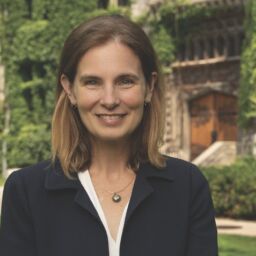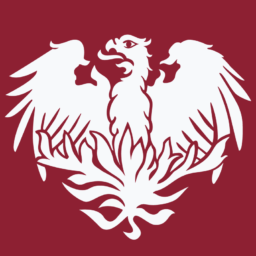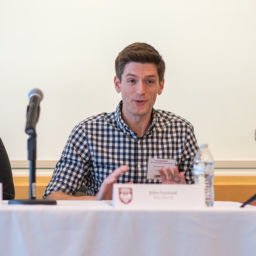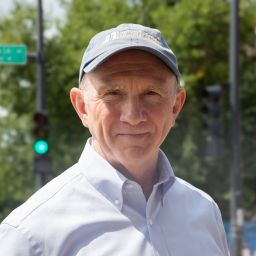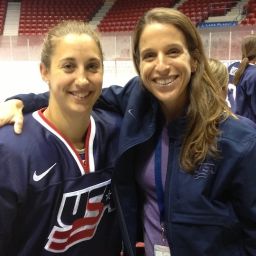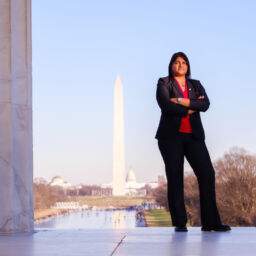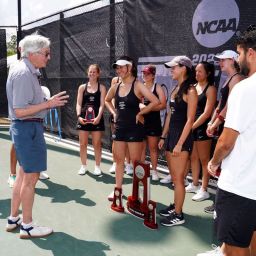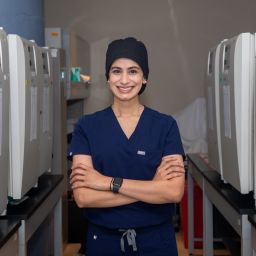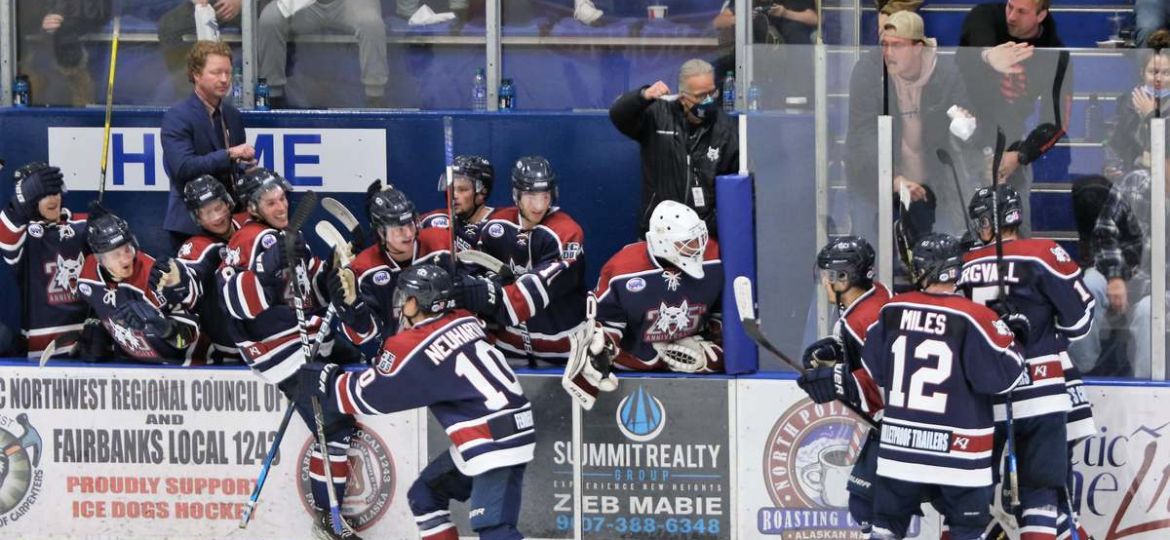
Cary S. Keller, MD’78, FACSM
Location: Fairbanks, Alaska
- Chief of Sports Medicine Outreach, Foundation Health Partners, Fairbanks, Alaska
- Created University of Chicago’s first sports medicine clinic for student athletes
- Founded Alaska’s first sports medicine center
- Helped pass a concussion law in Alaska to improve student safety
- Team physician for the University of Alaska Fairbanks, North Star Ballet, Fairbanks Ice Dogs hockey and high school teams
From the South Side to Alaska
In 1984, after finishing his residency at the University of Chicago Medicine and a sports medicine fellowship in Cincinnati, Keller was interviewing for academic positions when a job posting in Alaska caught his eye. Keller had backpacked and camped in mountainous national parks during his breaks at Pritzker — and those trips led to profound moments of self-discovery.
“There was a poetry inside me that was touched by being outdoors,” he said. “As the years went by, and I spent most of my time surrounded by concrete and asphalt in cities, I started to think maybe it made more sense to live somewhere where, in my free time, I could do the things that were personally important to me.”
Keller made his first trip to Alaska to interview for the chief of orthopaedic surgery position at a Fairbanks clinic. He was smitten with the state’s natural beauty.
“The physicians I met could step out of their back door to go kayaking or back- packing or mountain biking and they didn’t have to travel two days by jet to get to a place where they could do that. It was a really appealing work-life balance,” he said. “Although it was a real 180 for my career, I decided to take the job in Alaska.”
Keller had long dreamed of establishing a sports medicine center. Private groups in Alaska seemed more receptive to his idea than academic centers in the lower 48 states, because the concept was still new to many universities. That clinched the deal. He moved to Alaska in 1984 and has lived there ever since.
A family of Pritzker physicians
Keller is part of a Pritzker School of Medicine alumni family, including his father, a psychiatrist, and his sister, a neuroradiologist. His daughter, now a cardiology fellow, broke rank and went to Oregon Health & Science University for medical school. Keller might not have gone to Pritzker if not for a pep talk from then-Dean Joseph Ceithaml, PhD, who instilled in him the confidence that he could make important contributions to the University of Chicago — and to the world. To express his gratitude, Keller has generously donated to the Joseph J. Ceithaml Endowed Scholarship Fund for Pritzker students since he graduated in 1978.
Creating UChicago’s first sports medicine clinic
As an orthopaedic surgery resident at UChicago Medicine in the early 1980s, Keller spent a lot of time covering the ER. He noticed UChicago athletes would come in, even for minor issues, because there was no medical staff available to them elsewhere.
“That seemed suboptimal to me,” he said. “These kids were playing their hearts out for their school, devoting significant parts of their lives to training and competition, doing their best to be Monsters of the Midway, and we didn’t really have an organization to support them when they had injuries or other medical problems.”
It inspired Keller to open a small sports medicine clinic for athletes in UChicago’s field house — an unusual program for a college at that time. With backing from some orthopaedic faculty members, the clinic became very successful and helped reduce athlete injuries. The orthopaedics department eventually turned the clinic into a formal program.
“The clinic created a huge change,” he said. “It meant the athletes had immediate access to care.”
Keller would volunteer his services at UChicago sporting events and even rearranged his call schedule to travel with the football team.
“On the bus, there were detailed discussions of genetics, or debates about philosophy or conversational Latin. I can tell you, having traveled with many football teams, that was unique,” he said of the Maroons.
Creating Alaska’s first sports medicine center
Like he did at UChicago, Keller helped pioneer sports medicine in Alaska. Since many residents work in physically demanding industries, such as oil drilling, logging and fishing, demand is high for orthopaedic and sports medicine. Using a $1 million investment from Fairbanks Clinic, Keller helped build Alaska’s first sports medicine center, Sportsmedicine and Orthopedics Fairbanks, and recruited trainers and physical therapists nationwide to work there. As years passed, Alaskan hospitals opened their own sports medicine clinics and schools across the state hired athletic trainers.
“There’s so much fun and personal reward in starting something and nurturing it and seeing it become important,” Keller said.
Research he couldn’t do anywhere else
Alaska offered Keller unique research opportunities. His study of 32,000 smokejumpers — firefighters who parachute into wildfires to attack them — Keller has found unique research opportunities in Alaska, where many work in physically demanding industries. led to the redesign of their jumpsuits and replacement of round chutes with square ones to reduce injuries. He also studied competitive Iditarod mushers, who race dog sleds across 1,000 miles of Alaska wilderness for eight to 15 days. Besides back injuries, he found many mushers experienced hallucinations due to sleep deprivation and hyponatremia (low sodium).
Keller also studied 1,600 high school athletes in 15 sports, finding that injury incidents declined from 55% to 20% once sports medicine services — which he helped launch in school districts — became routine in high schools. Additionally, his research determined that athletic trainers could properly diagnose and treat about two-thirds of high school sports injuries. This enables students to receive quicker care and reduces the workload for local physicians, saving everyone time and money.
Safety improvements across Alaska
While a member of the National Federation of State High School Associations’ Sports Medicine Advisory Committee, Keller led the Alaska School Activities Association’s successful lobby for passage of Alaska’s 2011 concussion law. The state law requires a student athlete of any age who injures their head to be removed from the game until they can be evaluated by a trained medical professional. To support the law’s application, Keller traveled across the state lecturing healthcare providers on how to make concussion care decisions on the field and in their offices.
“In a number of ways, I’ve tried to be an activist and make things better in Alaska,” he said. “If just a handful of people take on that attitude, you can really change things. Physicians are often in a position where we can give back with our time and service and money, and really make our communities much better places, truly improving the quality of life and public health. And I always think of those actions as a tribute to Dean Ceithaml. It’s the circle of giving.”
Read the full story on Medicine on the Midway.


